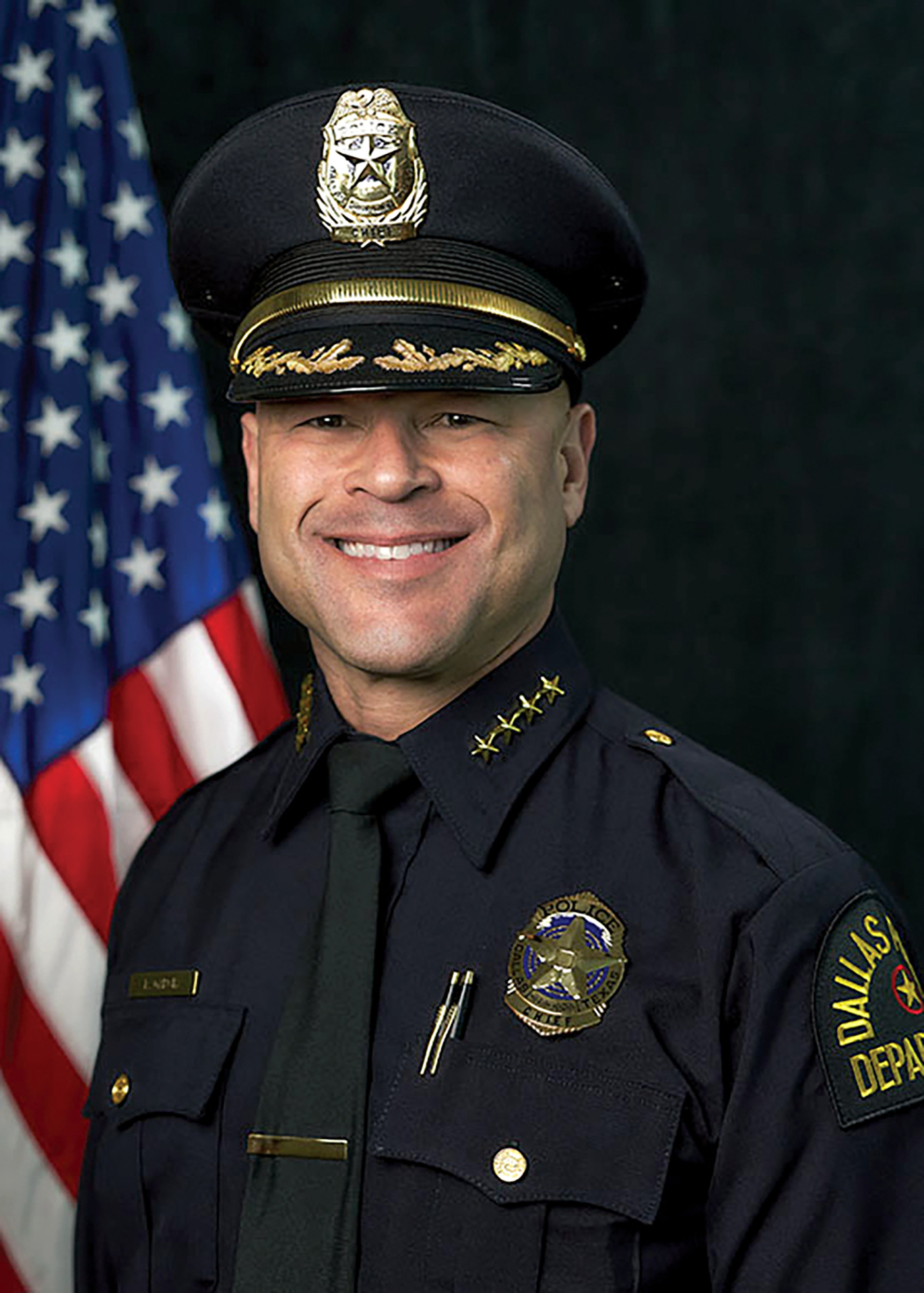Dallas Police Chief introduces algorithm-based personnel intervention system to assess officer behavioral risk, raises c
Forum Information
You will earn 1.5 pts. per new post (reply) in this forum.
**Registered members may reply to any topic in this forum**
You will earn 1.5 pts. per new post (reply) in this forum.
**Registered members may reply to any topic in this forum**
-
NHGF [Feed]

- Posts: 17274
- Joined: Mon Oct 30, 2017 5:16 pm
- Contact:
- Status: Offline
 iStock.com/Kirkikis
iStock.com/Kirkikis  Dallas Police Chief Eddie Garcia (Dallas Police Department) The Dallas Police Chief introduced the department’s tentative new personnel intervention system to the city council, which will assess officer behavioral risk and allow supervisors to intervene and manage officers flagged for atypical behavior patterns. While the chief defended the system developed by law enforcement technology company Benchmark Analytics as a means to help officers with their productivity without punishing them, police union officials are concerned it will be used rather as a means to label and punish officers. Chief Eddie Garcia argued that the new alert system will help restore the community’s trust by identifying officers who need greater supervision. He told the city’s public safety committee that the goal of the system is to intervene in a “nonpunitive” way to help officers have a successful career. Officials say the system focuses on improving officers’ interpersonal skills, such as time management, respectfulness, leadership, community engagement and conflict resolution. “Regardless (of) the caliber of officer on day one, sometimes that caliber of officer in year five, year six, year seven is a different individual based on things that occurred in his or her career,” García said. The Benchmark Management System (BMS) aggregates data about an officer and compares it with data from an officer’s peers. For example, it evaluates an officer’s use-of-force background, external and internal complaints, traffic stops, arrests and other information, and compares that with data from colleagues of similar rank and level of experience. According to The Dallas Morning News, the system then calculates a risk assessment for each officer based on the data, quantifying how far their behavioral patterns stray from the norm. Officers with activity patterns outside the norm and who are determined to be at risk are “flagged,” which alerts supervisors to implement “advisory or actionable intervention.” Supervisors then meet with the officer to discuss their behaviors, actions and well-being, as well as determine areas for improvement. Deputy police Chief William Griffith said the system is already being used by some metropolitan cities like Phoenix, Arizona, adding that its research-based approach can proactively help officers before adverse events occur. Nick Montgomery, chief research officer with Benchmark Analytics, said an average of 4 to 6% of Dallas’ officers – roughly 126 to 189 – will be flagged over the course of a year based on the algorithm. Some council members, like Cara Mendelsohn, raised concerns about the system’s punitive nature, as it generates a list of “flagged” officers rather than a list for supportive outreach. She also was wary about evaluating officers based on an algorithm. “What I’m concerned about is that officers are going to be identified by an algorithm that we don’t even know what’s part of it, sounds a little like Facebook to me, and we’re going to have no input on,” Mendelsohn said. Garcia assured that the system will not be used for disciplinary action but for proactive career support. “This is not necessarily going towards a disciplinary action, this is to save our officers and to save their careers and to save the integrity and professionalism of the Dallas Police Department,” García assured. “And to try to find ways to intervene sooner rather than later.” However, some police union officials are not convinced, arguing that such a system could infringe on officers’ rights. Dallas Police Association president Mike Mata called for greater transparency, and criticized the system for keeping “a record of officers and circumvents any type of due process,” as well as labeling officers without “properly looking at the situation.” “They need to be a little bit more transparent with the rank and file on how this is exactly going to be implemented before anything goes into actual use,” Mata said. Police officials at the council meeting said that transparency is built into the system since supervisors must send their decision up the chain of command for approval. Mata said he will closely observe the system’s reports to ensure they’re being carried out fairly. “We’re going to keep very close eyes on it and if there’s any abuse or improper labeling of officers we will take whatever means necessary to address it,” he said.
Dallas Police Chief Eddie Garcia (Dallas Police Department) The Dallas Police Chief introduced the department’s tentative new personnel intervention system to the city council, which will assess officer behavioral risk and allow supervisors to intervene and manage officers flagged for atypical behavior patterns. While the chief defended the system developed by law enforcement technology company Benchmark Analytics as a means to help officers with their productivity without punishing them, police union officials are concerned it will be used rather as a means to label and punish officers. Chief Eddie Garcia argued that the new alert system will help restore the community’s trust by identifying officers who need greater supervision. He told the city’s public safety committee that the goal of the system is to intervene in a “nonpunitive” way to help officers have a successful career. Officials say the system focuses on improving officers’ interpersonal skills, such as time management, respectfulness, leadership, community engagement and conflict resolution. “Regardless (of) the caliber of officer on day one, sometimes that caliber of officer in year five, year six, year seven is a different individual based on things that occurred in his or her career,” García said. The Benchmark Management System (BMS) aggregates data about an officer and compares it with data from an officer’s peers. For example, it evaluates an officer’s use-of-force background, external and internal complaints, traffic stops, arrests and other information, and compares that with data from colleagues of similar rank and level of experience. According to The Dallas Morning News, the system then calculates a risk assessment for each officer based on the data, quantifying how far their behavioral patterns stray from the norm. Officers with activity patterns outside the norm and who are determined to be at risk are “flagged,” which alerts supervisors to implement “advisory or actionable intervention.” Supervisors then meet with the officer to discuss their behaviors, actions and well-being, as well as determine areas for improvement. Deputy police Chief William Griffith said the system is already being used by some metropolitan cities like Phoenix, Arizona, adding that its research-based approach can proactively help officers before adverse events occur. Nick Montgomery, chief research officer with Benchmark Analytics, said an average of 4 to 6% of Dallas’ officers – roughly 126 to 189 – will be flagged over the course of a year based on the algorithm. Some council members, like Cara Mendelsohn, raised concerns about the system’s punitive nature, as it generates a list of “flagged” officers rather than a list for supportive outreach. She also was wary about evaluating officers based on an algorithm. “What I’m concerned about is that officers are going to be identified by an algorithm that we don’t even know what’s part of it, sounds a little like Facebook to me, and we’re going to have no input on,” Mendelsohn said. Garcia assured that the system will not be used for disciplinary action but for proactive career support. “This is not necessarily going towards a disciplinary action, this is to save our officers and to save their careers and to save the integrity and professionalism of the Dallas Police Department,” García assured. “And to try to find ways to intervene sooner rather than later.” However, some police union officials are not convinced, arguing that such a system could infringe on officers’ rights. Dallas Police Association president Mike Mata called for greater transparency, and criticized the system for keeping “a record of officers and circumvents any type of due process,” as well as labeling officers without “properly looking at the situation.” “They need to be a little bit more transparent with the rank and file on how this is exactly going to be implemented before anything goes into actual use,” Mata said. Police officials at the council meeting said that transparency is built into the system since supervisors must send their decision up the chain of command for approval. Mata said he will closely observe the system’s reports to ensure they’re being carried out fairly. “We’re going to keep very close eyes on it and if there’s any abuse or improper labeling of officers we will take whatever means necessary to address it,” he said.